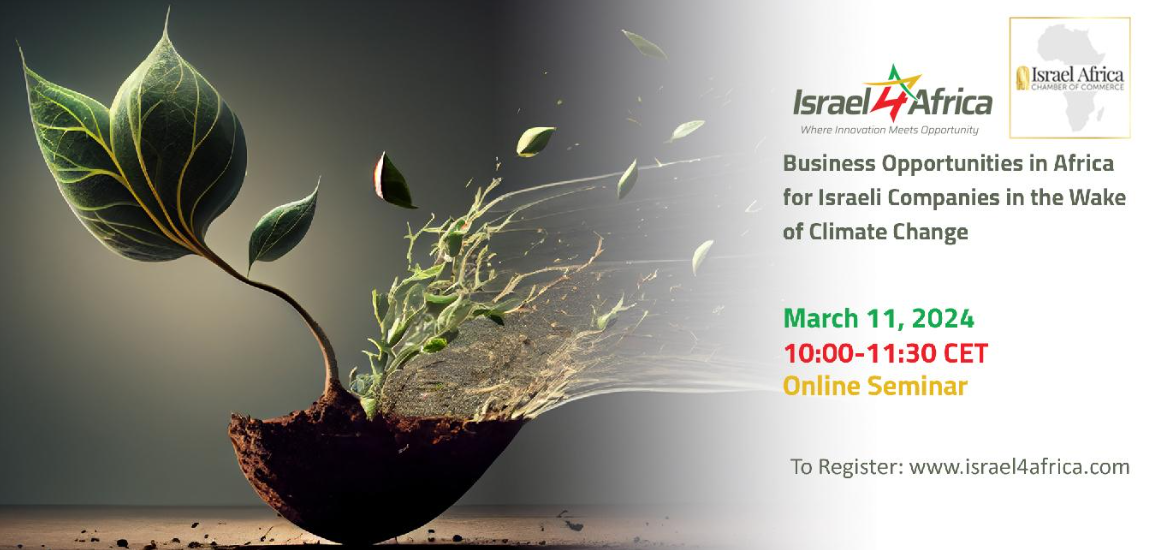
The global climate change crisis has created significant opportunities for Israeli entrepreneurs and companies to collaborate with African partners in offering solutions that may mitigate the impact of global warming, speakers said at a special webinar organized by the Israel Africa Chamber of Commerce in conjunction with Israel4Africa.
The virtual event, which took place on March 11, 2024, at 11:30, shed light on the challenges, needs, and opportunities arising from climate change. It also presented new avenues for cooperation among entrepreneurs, companies, and government officials.
The session began with opening remarks by Dr. Ayala Wittner, CEO of the Israel Africa Chamber of Commerce, and Prof. Gadi Ravid, VP of Education at the Chamber of Commerce. This was followed by a brief introduction by Leo Vinovezky, Director of the Department for Africa, Latin America & the Caribbean at the Israeli Ministry of Foreign Affairs, who emphasized the considerable potential for cooperation and funding opportunities.
Ambassador Gideon Bacher, the Israeli Ministry of Foreign Affairs Special Envoy for Climate Change, provided a comprehensive overview of the climate crisis in Africa and the scope of opportunities for Israeli entrepreneurs.
The ambassador highlighted that the African continent is the most vulnerable to the climate crisis globally. With the fastest-growing population and the most accelerated urbanization process, Africa is suffering from a water crisis, loss of biodiversity, and desertification.
Bacher gave several examples of the dire situation, noting that East Africa is facing its worst food crisis in the 21st century. He concluded that the main opportunities lie in the following sectors:
- Renewable energies and energy storage, including green hydrogen production
- Water management
- Sustainable transportation
- Protection of nature and biodiversity
- Sustainable tourism
- Carbon capture and storage for the sale of carbon credits
Following the presentation, Simon van Dam, Co-Founder of Israel4Africa, reviewed joint projects promoting sustainability in Africa and funding opportunities.
The session concluded with a presentation by Tony Tiyou, Founder and CEO of Renewables in Africa, who made a compelling case for the shift towards renewable energy in Africa, framed within the context of escalating global warming challenges.
Tiyou began by acknowledging the severe impact of climate change locally, noting that the last decade has been the hottest on record, with natural disasters occurring at a rate four times higher than the global average. This backdrop set the stage for discussing Africa’s current energy framework, which boasts an installed capacity of 260 GW, emphasizing the continent’s vast but underutilized renewable energy potential.
He outlined five key renewable energy sources critical for Africa’s energy future:
- Solar energy
- Wind power
- Hydroelectric power
- Geothermal energy
- Biomass
Tiyou highlighted recent achievements, such as the record 3.7 GW annual solar installation and the cumulative wind capacity of over 9 GW, alongside areas that require more attention, like green investments. According to Tiyou, opportunities within the green hydrogen, wind energy pipeline, and e-mobility sector are showcased as examples to exploit.
The presentation concluded with a call to action to transform Africa’s energy landscape into a sustainable model, inviting stakeholders to engage and invest in renewable energy opportunities, thus addressing climate change challenges while fostering economic development in the region.